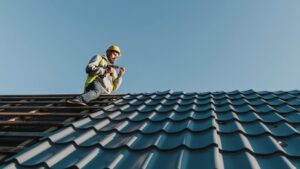The roof of a home is undeniably one of its most vital structures, continuously working to protect the interior from harsh climatic conditions. It shelters us from rain, resists wind and snow loads, and endures the brunt of the hot sun. But what happens when the regular roof isn’t enough? That’s where an insulated roof comes to the rescue.
Insulated roofing panels or roofs, also known as cool or energy-efficient roofs, are the modern homeowner’s smartest bet against the relentless heat and frosty winters. With rising energy costs, the significance of an insulated roof reaches beyond mere shelter. It’s an investment in comfort, energy efficiency, and long-term financial savings.

Types of Insulation:
Now, when deciding to upgrade your roof insulation, it’s crucial to understand the different materials available for insulation. Foam insulation, including rigid and spray foam, batt insulation, and cellulose insulation, are popular. Each insulation type has unique properties, making them better suited for different situations. Foam insulation, for instance, is particularly effective at providing high-density insulation in smaller spaces. In contrast, batt insulation offers an easy solution for a wide variety of needs.
Advantages of Insulated Roofing Panels :
The excellent insulation offered by insulated roof panels provides several advantages for residential and commercial structures.
A significant benefit is increased energy efficiency. The need for excessive heating or cooling is decreased thanks to these panels’ ability to minimise heat transfer through the roof. Insulated roof panels help to significantly reduce energy use and power costs by maintaining a moderated temperature.
Insulated roof panels can also result in lower heating and cooling expenses. With better insulation, the heating and cooling systems can run more effectively and use less power to maintain the desired temperature. This can eventually lead to significant cost savings and a greener footprint.
There are several crucial factors to take into account before you start installing insulated roof panels. Considering these factors will guarantee an effective installation that gives you long-term advantages.
-
Building codes and regulations:
It is crucial to become familiar with your area’s building codes and regulations (contact your local council for guidelines). Specific installation and insulation standards for roofs may vary by region. To avoid any future legal problems or complications, abide by all applicable local laws.
-
Structural factors:
Examine your patio roof’s structural strength to see if the weight of the insulated roof panels can be supported. If you need to, speak with a structural engineer if your roof is weakened or older. It is crucial to ensure the roof can support the extra weight safely without losing integrity.
-
Climate and weather considerations:
Be aware of the local climate and weather. The thermal resistance of various insulated roof panel types varies, impacting how well they perform in multiple climates. Take into account the typical temperatures, the relative humidity, and the intensity of weather phenomena like storms or hail. Pick insulated roof panels appropriate for your region’s climate to maximise their efficiency.
The slope and design of your roof may impact the installation procedure and the insulated roof panel you choose. Steeper roofs might need extra safety measures and specialised installation methods. Considerations for specific waterproofing may be necessary for flat roofs. The best method for installing the panels and ensuring proper drainage will depend on the slope and design of your roof.
-
Fire safety:
Insulated roof panels should follow fire safety regulations to protect your property and its occupants. Check the fire ratings and certifications of the selected panels to ensure they meet the necessary safety requirements. Consider adding fire safety precautions like installing fire breaks between panels or applying fire-resistant coatings.
After considering these things and making the necessary preparations, you can start the installation procedure. It is crucial to adhere to the recommendations and instructions provided by the manufacturer for your particular brand of insulated roof panels.
In Conclusion:
Insulated metal roof panels offer several benefits over traditional roofing solutions. They are highly cost-effective, energy-efficient, and easy to install, making them popular. Are they the right product for your property? Let’s help you find out at https://ezibatten.com/ now!
